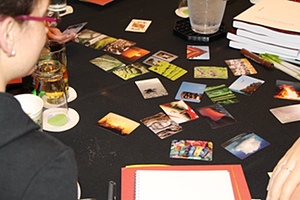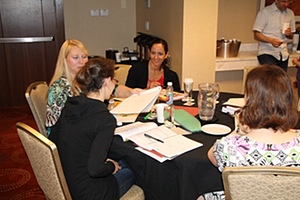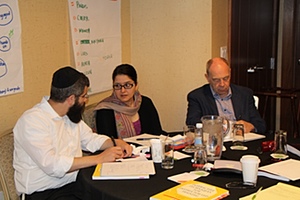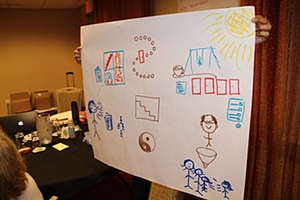THIAGI GAMELETTER:
July 2013
SERIOUSLY FUN ACTIVITIES FOR TRAINERS, FACILITATORS,
PERFORMANCE CONSULTANTS, AND MANAGERS.
TABLE OF CONTENTS
Masthead
Our mission statement, copyright notice, and cast
of characters.
Card Games
Fluency Cards
List, Compare, Draw, and Act.
Jolt
Series Puzzles
What comes next?
Special Offer
Fluency Cards decks
Five for the price of four.
Workshop Report
Interactive Techniques Workshop: Albany by Matthew Richter
Albany, New York in June.
US Workshops
Workshops in the USA
Our most popular workshop in four more
cities.
International Workshops
Workshops outside the USA
Two workshops in Singapore.
From Brian's Brain
A Lot of Suspense by Brian Remer
A link to the latest issue of Brian's
newsletter.
Online Survey
Universal Training
Is there an all-purpose training
objective?
Survey Results
How Authentic Is Your Training?
A summary of your responses.
Check It Out
Connie Malamed ( theelearningcoach.com and understandinggraphics.com )
Practical prescriptions from
research.
Masthead
THIAGI GAMELETTER:
SERIOUSLY FUN ACTIVITIES FOR TRAINERS, FACILITATORS,
PERFORMANCE CONSULTANTS, AND MANAGERS.
Mission
To increase and improve the use of interactive,
experiential strategies to improve human performance in an
effective, efficient, and enjoyable way.
Editorial Roster
 Author and Editor
: Sivasailam (Thiagi) Thiagarajan
Author and Editor
: Sivasailam (Thiagi) Thiagarajan
 Assistant Editor
: Raja Thiagarajan
Assistant Editor
: Raja Thiagarajan
Associate Editors: Tracy Tagliati and Jean Reese
Contributing Editors: Brian Remer
Editorial Advisory Board: Bill Wake, Matthew Richter, Samuel van den Bergh, and <type your name here>
Copyright Info
The materials in this newsletter are copyright 2013 by The
Thiagi Group. However, they may be freely reproduced for
educational/training activities. There is no need to obtain
special permission for such use as long as you do not
reproduce more than 100 copies per year. Please
include the following statement on all reproductions:
Reprinted from THIAGI GAMELETTER. Copyright © 2013
by The Thiagi Group, Inc.
For any other use of the content, please contact us (
thiagi@thiagi.com ) for permission.
Subscription Info
To sign up, or to donate and help us continue this
newsletter, please see the Online
Newsletter page on our website (
http://thiagi.com/pfp.html ).
Feedback Request
Thiagi believes in practicing what he preaches. This is an
interactive newsletter, so interact already! Send us your
feedback, sarcastic remarks, and gratuitous advice through
email to thiagi@thiagi.com . Thanks!
[Table of Contents]
Card Games
Fluency Cards
We have been play-testing and tweaking this card game (under
different names) for the past 30 years. Most of our continuous
improvement tweaks involved simplifying the play of the game.
We are happy with the current version because it provides an
engaging and fast-paced activity.
Training Objective
The goal of this card game is to increase the fluency with
which the players are able to handle concepts, principles,
and procedures associated with a specific training topic
(such as trust, feedback,
motivation, coaching, or
leadership). The game does not deal with factual
information or technical jargon. Nor does it review the
content of a specific training workshop, a best-selling
book, or a popular conceptual model. The game rewards the
players for the knowledge of the topic without bothering
about where they acquired it: from reading books, attending
workshops, or acquiring street smarts from tough
experiences.
It's All In The Cards
The game uses a deck of cards, each with an appropriate
item for the players to handle. There are four suits of
cards (just as in the case of regular playing cards), each
with a specific type of items. To win a card, the player has
to perform a specific task.
At the end of 10 minutes of play, the person who has
collected the most cards wins the game.
Players
Three players play the game. It can also accommodate four
or five players. Larger numbers of players can be divided
into several playgroups for parallel play.
Players take turns to be the judge during each round of the
game. During his or her turn, the judge turns over the top
card of the shuffled deck. The judge cannot win the card;
the other two players compete to win the card.
Games Within Games
A different sub-game is played with each of the four suits
of cards. These sub-games require the players to perform
different types of tasks. The judge decides who won the
round and gives the card to the winner.
Here are brief descriptions of the four sub-games
associated with the four suits of cards:
-
List. Each of the 13 spades cards
contains the name of a category. (Example: ♠10 in
the Customer Service deck displays
the category words and phrases that customers like
to hear.) The two competing players take turns to
announce an item that belongs to the category (example:
discount). The judge listens to these items
until one of the players hesitates too long or repeats a
previous item. When this happens, the other player wins
the card.
-
Compare. Each of the 13 clubs cards
contains two related concepts. (Example: ♣2 in the
Feedback Techniques deck displays
downward feedback and upward feedback.) The
competing players independently write one major similarity
(example: both give information about a behavior of
the other person) and one major difference (for
example, downward feedback is traditional while upward
feedback is unconventional) between the two
concepts. After a suitable time limit, the judge collects
the two sets of responses, reads them, and decides which
set is the better one. The author of this set wins the
card.
-
Draw. Each of the 13 hearts cards
contains a single concept. For example, ♡2 in the
Presentation Skills deck displays
the word humor.) The competing players
independently draw a picture (example: several smiling
faces or a clown) that is strongly
associated with the concept. The judge studies the two
pictures and gives the card to the artist who drew the
more meaningful and memorable one.
-
Act. Each of the 13 diamonds cards
contains a scenario for a roleplay. (Example: ♢3 in
the Managing Globally deck displays
a primary role [Vice President], a secondary role
[Manager of Asian Division], and a situation
[to give constructive feedback without making the
other person lose face]). The person on the judge's
left takes the primary role. The other person takes the
secondary role. The judge watches 2 minutes of the
roleplay and decides if the primary player did an
effective job. If so, this actor gets the card. If not,
the card is set aside.
Same Game, Different Topics
The same games can be played with different decks of
Fluency Cards. We currently have 13
different decks dealing with various corporate training
topics. We are working on several more topics.
[Add your feedback]
[Return to Table of Contents]
Jolt
Series Puzzles
This is another one of our counter-complacency jolts. It
warns you against feeling smug about your successes and
reminds you that what worked earlier may not work now.
Synopsis
Participants review a series of numbers and determine what
number comes next. The first two series can be analyzed
through mathematical thinking. The third series, however,
requires an entirely different type of reasoning.
Purpose
To think logically and laterally.
Participants
Minimum: 1
Maximum: Any number
Best: 10 to 30
Time
3 minutes for the activity
3 to 5 minutes for the
debriefing
Supplies
Preparation
Prepare the puzzles. Write these three
series of numbers on three sheets of flipchart:
- 1, 4, 7, 0, 3, 6, ?
- 0, 9, 1, 8, 2, 7, 3, 6, 4, 5, 5, ?
- 8, 5, 4, 9, 1, 7, ?
Instead of wasting flipchart paper, you can go green and
prepare PowerPoint slides with each of these series.
Flow
Present the first series puzzle. Ask the
participants to study the numbers in the series and to
discover the pattern among them. Invite them to yell out the
next number. If necessary, announce the answer (9) and
challenge the participants to discover the number that comes
after that.
Explain the first pattern. Congratulate
the participants for using their logic to discover the next
number. Invite them to explain the pattern. If necessary,
clarify that each number is three more than the previous
one. If the resulting number is greater than 10, subtract 10
from the answer to give a single-digit answer.
Present the second series puzzle. Ask the
participants to study the numbers in the series and to
discover the pattern among them. As before, invite the
participants to yell out the next number. If necessary,
announce the answer (4) and challenge the participants to
discover the number that comes after that.
Explain the second pattern. Congratulate
the participants and ask them to explain the pattern. Wait
for the responses and clarify that each pair of numbers adds
up to 9.
Present the third series puzzle. Tell them
that this is the last of the puzzles. As before, ask the
participants to study the numbers and to discover the
pattern among them. Invite the participants to announce the
next number. It is unlikely that anyone will come up with
the correct solution. Announce the answer (6) and challenge
the participants to discover the number that comes after
that. (Take a moment and try to figure out the next
number—and the pattern—before you continue
reading.)
Explain the pattern. Congratulate any
participants who have solved the pattern. Explain the
pattern: The numbers are listed in alphabetical order in
English!
Debriefing
Explain the concept of negative transfer.
Point out that the first two puzzles required mathematical
thinking while the third one required language-based
thinking. Suggest that the success of the first two attempts
encouraged people to find a mathematical solution, instead
of looking for alternative approaches.
Invite the participants to come up with their own examples
of initial success discouraging flexible thinking.
Learning Point
Try alternative approaches to problem solving instead of
rigidly following the approach that worked successfully in
the past.
[Add your feedback]
[Return to Table of Contents]
Special Offer
Fluency Cards decks
We have these 11 different decks of Fluency
Cards for immediate shipping:
- Building Trust
- Coaching for Performance
- Conducting Job Interviews
- Customer Service
- Feedback Techniques
- Leadership Strategies
- Listening Skills
- Management Essentials
- Managing Globally
- Motivation Techniques
- Presentation Skills
Special Discount
Here is the discount that we are offering only during the
month of July:
- If you buy five decks of Fluency Cards at the same
time, you only pay the price of four. In other words, you
save $49.95. (You still pay the $9.50 shipping charge for
each deck.)
- You can mix and match the five decks. You can buy five
different decks or several copies of the same deck (to
play with large groups of participants or to give as gifts
to your colleagues).
This offer is valid only during the month of July. Order by
July 31, 2013.
To take advantage of this discount, visit our online store.
Order five or more Fluency Cards decks and
enter TGL-FC5 as the coupon code when you
check out.
We will give you a $49.95 discount on the total of your
order.
We will add $9.50 per deck for shipping to USA addresses.
If your address is outside the USA, the shipping charge will
be higher. We will email you how much it will cost before we
ship the cards to you.
[Add your feedback]
[Return to Table of Contents]
Workshop Report
Interactive Techniques Workshop: Albany
by Matthew Richter
On June 18th, we conducted the first in the series of our US
Interactive Techniques for Instructor-Led
Training workshops. The workshop (in
Albany, NY) had participants from all over the Northeast,
including several folks from Montreal and Toronto. We had
independent trainers, corporate trainers, and not-for-profit
trainers. The group enthusiastically explored different
training activities including openers, closers, jolts, textra
games, puzzles, structured sharing activities, interactive
lectures, simulations, interactive storytelling, improv games,
magic, and more.
Here's a small photo journal of the three days:

Reviewing Day 1 activities with Photo Jolt cards

Team
members brainstorming

Getting ready to prepare a poster

Poster with highlights of what participants
learned

The person who learned the most from the workshop
For participants' insights into this workshop, see this
video: https://www.youtube.com/watch?v=oRu93zC0tAY .
[Add your feedback]
[Return to Table of Contents]
US Workshops
Workshops in the USA
For the past 20 years, Interactive
Techniques for Instructor-Led Training
has been rated by participants around the world as one of the
best training-design and -delivery workshops. Based on local
demand, Thiagi and Matt are happy to announce that they will
present this workshop in four more US cities in 2013.
WHAT:
Interactive Techniques for Instructor-Led
Training: A 3-day workshop
FOR WHOM: Trainers, facilitators,
instructional designers, performance consultants, and
managers
HOW MUCH: Regular registration rate: $1600.
As a reader of the Thiagi GameLetter,
get $200 off by entering coupon code TGL-WS13 when
you register online.
FOR MORE INFORMATION Watch this video: http://www.youtube.com/watch?v=m9lJvilwIoU .
4. San Francisco, California, USA
WHEN: August 19-21, 2013.
MORE INFORMATION: Review the brochure (1.2M PDF).
Register now!
5. Dallas, Texas, USA
WHEN: October 1-3, 2013.
MORE INFORMATION: Review the brochure (1.2M PDF).
Register now!
6. Orlando, Florida, USA
WHEN: October 15-17, 2013.
MORE INFORMATION: Review the brochure (1.2M PDF).
Register now!
7. Atlanta, Georgia, USA
WHEN: November 5-7, 2013.
MORE INFORMATION: Review the brochure (1.2M PDF).
Register now!
[Add your feedback]
[Return to Table of Contents]
International Workshops
Workshops outside the USA
Thiagi and his associates are happy to announce these
workshops outside the USA. Check our online calendar at http://thiagi.com/calendar/ for details.
-
Singapore: September 2-4, 2013.
Interactive Training
Strategies.
-
Singapore: January 9-11, 2014.
Interactive Training
Strategies.
[Add your feedback]
[Return to Table of Contents]
From Brian's Brain
A Lot of Suspense
by Brian Remer

Assumptions can get us in trouble but not if we let them hang
out for others to see. You can use a new table top game to get
your team talking about their hidden assumptions, work-life
balance, and many other topics. Find out how you can use
Suspend as a metaphor to meet many of your team challenges.
Power Tip: Hold your new idea up for
examination so people can identify the context supporting it
and decide its truth and relevance.
Read more in the June 2013 issue of Firefly News
Flash: http://www.thefirefly.org/Firefly/html/News%20Flash/2013/June%202013.htm
.
[Add your feedback]
[Return to Table of Contents]
Online Survey
Universal Training
Recently, we have been debating whether there are any
fundamental training objectives that should be achieved by all
levels of employees from all types of organizations. We
interviewed several clients and surfed the Internet in search
of an answer. The top choices included training objectives in
the broad areas of communication, customer service,
performance improvement, leadership, and learning to
learn.
As a result of our exploration, we are now back to square
one. We are not even sure if our original question was a
legitimate one. We would like your inputs to settle our
disputes.
Poll Question
Are there some training topics that are indispensable to
all levels of employees in all types of organizations?

(The poll opens in a new window.)
Open Question
What fundamental training topics are the most useful ones
for most organizations?

(The survey opens in a new window.)
In addition to listing the topics, please provide some
justification for your choice of these topics.
You may include your name along with your response, or if
you prefer, keep it anonymous.
[Add your feedback]
[Return to Table of Contents]
Survey Results
How Authentic Is Your Training?
Poll Question
In the June 2013 issue of TGL we asked you
to rate the authenticity of your training.
Twenty-one people responded to the poll. No one confessed
to a low level of authenticity; 57 percent rated themselves
at medium level while 43 percent went for high
authenticity.
Open Question
We asked our readers this open question:
What suggestions do you have for increasing the
authenticity of training?
Here are a few excerpts from your responses:
6) Use more real examples, not sample examples.
5) To increase scenario authenticity, don't just settle
for examples given by one Subject Matter Expert. Do more
research, if time permits. Observe workers in action.
Listen in on customer phone calls. And, perhaps most
importantly, take time to run your scenarios by several
other SMEs and members of your audience.
4) Our training design team is centralized and therefore
a little bit removed from day to day revenue generating
work and workers. As our instructional designers come up
with questions, activities and test items, it's vital they
verify the authenticity of context, process and content
details with appropriate individuals. Not just “Is what
I've created accurate?” But “Is this real? Is this
the way it works in real life?”
Thanks to everyone who responded.
You Can Still Participate
This survey is still open. Feel free to add your comments
by visiting the survey page.
[Add your feedback]
[Return to Table of Contents]
Check It Out
Connie Malamed is an accomplished and adroit thought leader
in our field. Her work spans many areas that deal with how
people perceive, comprehend, and interpret information. She is
involved at the intersection of cognitive psychology, design,
and communication. Her projects include online and multimedia
learning, information design, visual presentations, website
design, user interface design, user experience design, and
other similar areas.
Connie researches and writes two interesting websites.
The eLearning Coach ( http://theelearningcoach.com/ ) is a blogazine. It
presents actionable strategies, tips, and interviews with
experts and reviews for people involved in learning. In spite
of its name, The eLearning Coach has practical
articles of immediate relevance to all types of trainers and
instructional designers. For example, here are some of the
articles I read recently:
- Leverage how the brain works
- How To Write Better Analogies for Learning
- 10 Books for Learning Professionals To Read in
2013
- 20 Things To Remember About Forgetting
- 10 Ways To Design for Emotions
Connie's second website is Understanding Graphics ( http://understandinggraphics.com/ ) It is an
extension of her book, Visual Language for
Designers. This blog covers visual communication
topics and distills relevant research into digestible
bite-sized chunks.
Thank you, Connie, for consistently translating
evidence-based principles into practical prescriptions.
[Add your feedback]
[Return to Table of Contents]
 Author and Editor
: Sivasailam (Thiagi) Thiagarajan
Author and Editor
: Sivasailam (Thiagi) Thiagarajan Assistant Editor
: Raja Thiagarajan
Assistant Editor
: Raja Thiagarajan






